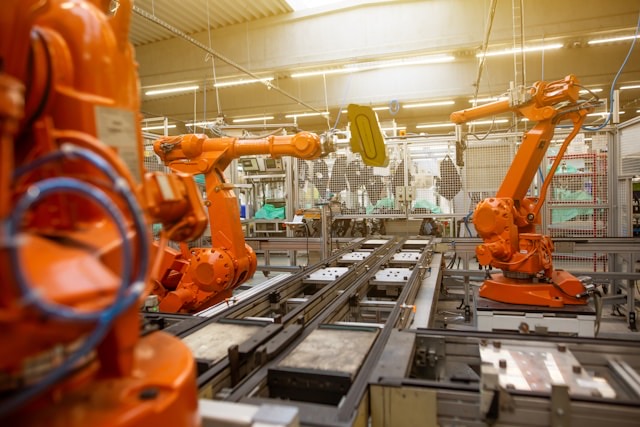Tech
The Future of Smart Manufacturing Starts with Automation Tools

Modern manufacturing is continuously evolving; the methods that you learned or practiced when you first started your career are changing at breakneck speed. The repercussions of the past may not seem like much, but it has forced many producers to work with smarter technologies. The competition at a global level has made the adaptation of smarter technologies an absolute need. Automation is already the key factor in many factories, and it is becoming more significant every day. No matter where you look, smart manufacturing will be adopted digitally; in fact, its future depends largely on these tools. Adopting automation tools is a significant step that is vital to put you on the track of being successful in the modern production process.
Redefining Efficiency in Production
You have an opportunity to boost your factory’s speed and efficiency with the innovative tools of automation. Rather than going back and forth resolving avoidable pauses, systems that run automatically can sustain continuous production, which cuts down valuable time significantly. Mistakes can be eliminated to a great extent, making the procedures more precise and wasting less material. Your output may also be standardized, with a defined performance level created, thus enabling you to produce considerable amounts without sacrificing quality. This approach enables your workforce to increase production quicker and easier and yet, not burn out. There is a perfect blend of automation and production capacity, which results in a productivity network that is both smart and a reliable driver of efficiency.
Empowering the Workforce
Smart automation can liberate your staff by allowing them to do more intelligent work. This relocation of repetitive tasks empowers operators and employees to work according to their skill set and focus on areas that require creativity and strategic thinking. Automation reduces the physical burden of an assembly line by taking on repetitive tasks and thereby alleviating fatigue. Many modern factories combine technology with workforce training and make their jobs safer and enhance ergonomics through automated processes. A smart assistant tool for daily tasks and training enhances employees’ profiles and creates a feeling of safety and support. When technology is made a source of empowerment, you generate a working environment that appreciates the potential of your staff.
Strengthening Decision Making with Data
Data is a significant concept of unbiased decision-making in modern smart production. Real-time metrics, system performance, and production quality can be seen at a glance with modern dashboards and visualization technologies. The intelligence of a production line enables you to detect abnormalities in maintenance or defects well before they cause significant breakdowns. You will also be in a position to spot the long-term recurring trends and gain insights into production line efficiency. The data-backed approach enables better planning, less erroneous guesswork, and informed decision-making by managers. The data-driven environment enables you to be responsive and efficient, and to back your decisions with a foundation of real facts.
Integrating Technology in Daily Operations
Smart manufacturing is about smartly connecting machines, people, and systems, allowing everything to function in sync. By connecting IoT devices, such as sensors and machines, and building a network inside the factory, you get a holistic production system that allows for sharing immediate information and adapting quickly. To make this possible, manufacturers often rely on advanced monitoring and control systems. For example, many factories make use of SCADA HMI systems to provide visual dashboards that monitor and control equipment in real time. Integrated solutions create smoother transitions in departments, and technology prevents а lot of mistakes in communication. New technology establishes a smart workflow between machines, people, and processes and allows а smoother change and adaptation without disruption.
Driving Innovation and Growth
The added automation in your manufacturing actually does aid in speeding up innovation. Thanks to rapid and efficient systems, you can try new product ideas and implement them faster. You can explore new markets without wasting resources and be prepared to serve larger orders because your factory will not be overloaded. You can also combine advanced production techniques and automation to make sure your business is sustainable and environmentally friendly, which often acts as a magnet for modern consumers and clients. With a greater degree of automation, your business is prepared to grasp whatever the future holds for your industry. It gives you a competitive edge, and prepares your operations intelligently in a changing world.
Conclusion
The face of tomorrow’s smart manufacturing is shaped by automation as it touches every aspect of production, speed, excellence, and intelligence. Businesses are learning to redefine productivity levels, and risk taking, thanks to tools such as automation, real-time data, and connected devices. Automated workplaces provide workers with safety, flexibility in work, and support in creative labor. The companies that invest in these technologies will not only perform better but will also be more prepared for the future challenges and needs of the market. Automation is not merely a tool; it is the instrument by which future factories are constructed smart, human-centric, and fully interconnected.
-

 Celebrity9 months ago
Celebrity9 months agoNick Schmit? The Man Behind Jonathan Capehart Success
-

 Celebrity9 months ago
Celebrity9 months agoChristina Erika Carandini Lee: A Life of Grace, Heritage, and Privacy
-

 Celebrity9 months ago
Celebrity9 months agoTrey Kulley Majors: The Untold Story of Lee Majors’ Son
-

 Celebrity10 months ago
Celebrity10 months agoJamie White-Welling: Bio, Career, and Hollywood Connection Life with Tom Welling
















